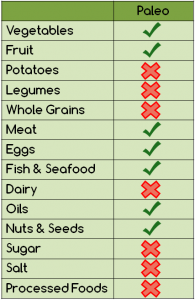Paleo and Mediterranean Diets Lower Cancer Risk
The Paleo and Mediterranean diets are often talked about for their health promoting benefits. Both are considered to have been used by various populations for many years. The longevity of use of the Paleo and Mediterranean diets has been one of the primary reasons that many still look to these diets when making food choices. Diets that have been around for this length of time certainly should not be overlooked as they seem to have something unique about them that warrant a closer look.
Paleo and Mediterranean Diets Concept
The Paleo and Mediterranean diets are not that dissimilar. Each has its own individual characteristics that make it unique. For example, the Mediterranean diet allows for the inclusion of grains. This is not a part of the Paleo Diet. In contrast, the Paleo Diet can be modified to be higher in fat or higher in vegetables. Yet with each of their differences, there is one common thread in the Paleo and Mediterranean diets that makes them very similar and allows them to offer some of the same health promoting benefits. This similarity is that they focus on food that is nutrient dense and not processed. The food of these diets is what our body demands. It provides the essential elements such as vitamins, mineral and healthy fats that are missing from the standard American Diet. In short, the foods of the Paleo and Mediterranean diets reduce the occurrence of disease, unlike foods of the standard American Diet which promote disease.
Paleo and Mediterranean Diets Validated
Many might argue that the Paleo and Mediterranean diets are fads. To those individuals I would ask, “Is eating real food that can support overall health a fad?” Of course it is not. Each of us knows that eating food that is nutrient dense is always a better choice that eating the refined option. But rather than be dogmatic about the issue, let us take a look at the science. After all, that is what the critics and skeptics are really asking for. They want to see validation that the Paleo and Mediterranean diets have evidence behind them and are not just opinion. Being more of a science minded individual, I can certainly appreciate this point. So with that said, let me refer to the latest article published on the Paleo and Mediterranean diets.
No doubt one of the scariest labels that anyone can be given is cancer. Cancer can be a paralyzing term and can take hold of every aspect of our health from the physical to the emotional. We all know that when possible, the best way to manage a condition is to prevent it. Professional organizations such as the American Cancer Society support the consumption of vegetables and fruits as part of a healthy diet. The use of these foods in the forms that nature provided to use is what supports long term health and lowers cancer risk. This can be seen with the outcome of a recent study showing that the Paleo and Mediterranean diets may be similar in their ability to lower the incidence of sporadic colon cancer. (Am J Epidemiol. 2014 Oct 17.) Additionally, it is also worth noting that if these diets can be used to reduce cancer risk, they can also be used to support an individual’s health during cancer as well as in non-cancerous situations.
Paleo and Mediterranean diets Reign Supreme
The Paleo and Mediterranean diets have stood the test of time as dietary patterns for entire populations. Now with investigation of these diets for modern populations, these diets are beginning to show their benefits in our modern environment. The study mentioned focused on the preventative nature of the Paleo and Mediterranean diets in one form of cancer, ie. colon cancer. However, the benefits of these diets extends not just into prevention of other forms of cancer, but other types of disease as well such as diabetes and cardiovascular disease. Is there a better dietary pattern to adopt? Not likely. You will be hard pressed to find anyone that would recommend consuming refined foods that are laden with chemicals as a preferred alternative to those that are dense in nutrients and support our body’s natural functions.



Leave a Reply